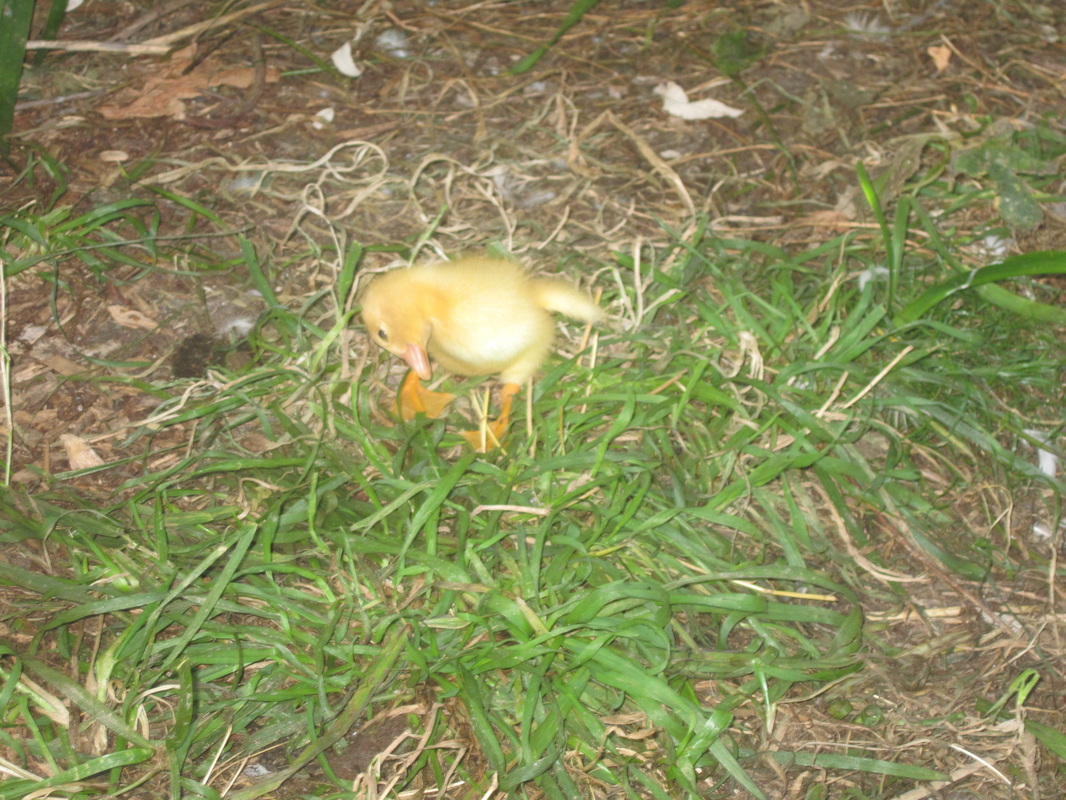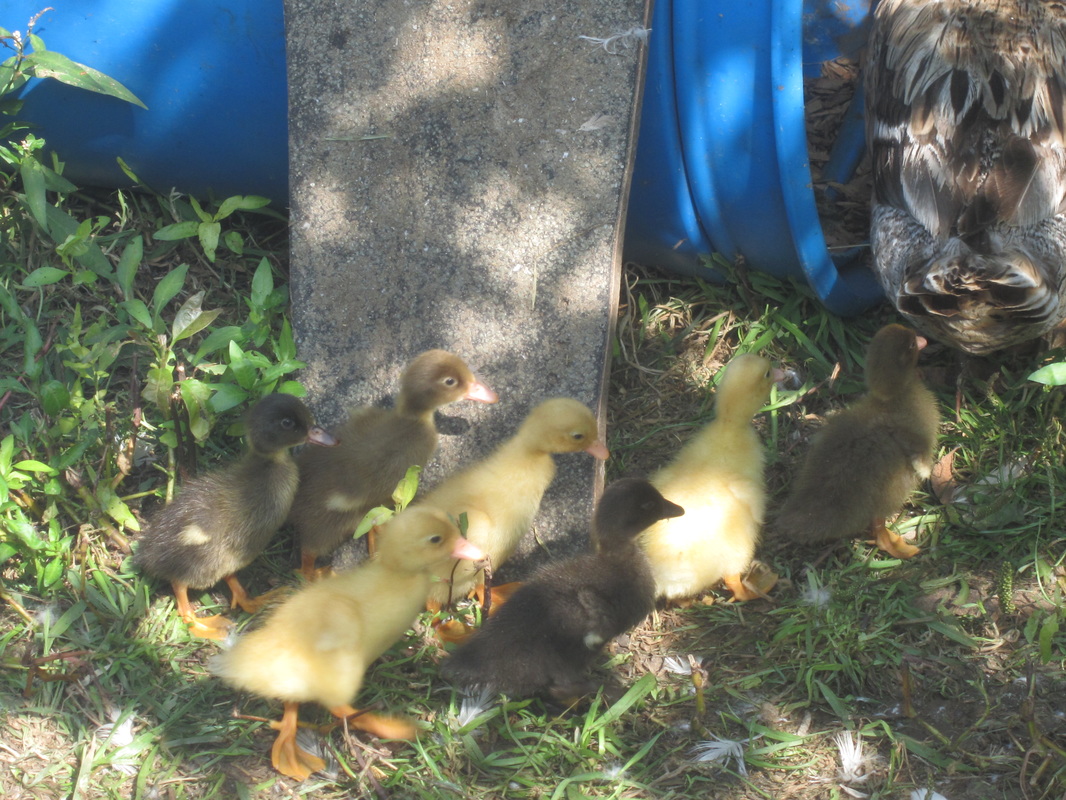One of my recently hatched ducklings looked peculiar. It kept turning it's head completely upside under it's body (so it looked headless from above) and walking backwards. Initially it was turning it's head to the side as it if was having trouble seeing, and putting it's head on its siblings as if feeling its way - I wondered if it might be blind. But as the symptoms worsened, I realised I was looking at a severe thiamine deficiency.
The first time I ever saw thiamine deficiency in animals was a few years ago. I went out one morning to check on our sheep and their new lambs. I noticed one 2-3 week old lamb lying curled up by herself, much further away from her mother and twin than is normal. After some observation, I gently moved closer, to encourage the lamb to stand and move, so I could see what, if anything was the problem. The lamb staggered to her feet, but was completely uncoordinated - it looked like she couldn't figure out how to get all four legs moving the right way at once. She finally made it over to her mother, and attempted to feed, but was unable to latch on, and then collapsed and curled up again. Hmmmm.......this didn't look like any of the other sheep disorders I was familiar with........after some contemplation, thiamine deficiency was determined as the likely cause. I obtained and administered a thiamine injection from the vet. It was like a miracle cure! An hour or so later, this wee lamb was happily bouncing around the paddock with the others, and feeding fine!
Not long after that, I started to pay attention to the Facebook posts of an American chap who had been sharing that he was having problems with his goat kids - a couple had died, and several others were very ill. He believed that severe parasite infections were the cause, and had treated them all for that. He was showing pics of one wee goat that as at death's door - he was worried it wouldn't make it through the night. Unable to stand or feed, it was very ill indeed. After looking more closely at info he had posted over the previous couple of days, I told him that I believed it was not parasites that were the problem, but severe thiamine deficiency, known as Goat Polio when it strikes goats. It is often induced by grain feeding; he was feeding his milking goats grain, and their kids were helping themselves too. I recommended he get and administer thiamine injections for all his kids, and withdraw all grain. He did so, and excitedly posted a couple of hours later about the miracle results - the very close to dead kid was now feeding and leaping about, and the others were all recovered too.
Thiamine deficiency results in neurological deficits, which show up as lack of coordination, staggering, strange flexion of the neck (star gazing), inability to feed normally, and finally death.
So, back to my wee duckling. He (I don't know yet if it's a he, but for convenience will refer to it as that) was hatched on Thursday morning. Friday I didn't notice anything strange. Saturday morning I observed the apparent blindness behaviour, but was away most of the day; by the time I got home I'd thought about it and suspected thiamine. That evening the duckling was twisting its neck so that its head was completely upside down and underneath it, and was walking backwards. Well, "walking" wasn't quite accurate - "scooting" is more like it. It would get stuck in odd places and cheep pathetically. Being the weekend, there was no vet available at reasonable cost. I thought about what I had on hand that would have good amounts of B vitamins in it. I added nutritional yeast to the ducklings crumbles.
The following morning (yesterday), it was looking just as bad. I picked him up and brought it inside, and started checking what else I had in the cupboards. A child's liquid vitamin would have been handy, but I didn't have any. Ditto thiamine injections. Finally I picked up my Spirulina powder, which we add to smoothie sometimes. Good amounts of niacin, thiamine, and other B vits. So I dissolved some in water, and spent some time slowly droppering the solution onto the little guy's upside down beak - he swallowed quite a bit little by little. After a while I concluded the stress of being held and away from mama probably was making him worse, so I returned him to the pen. I added more yeast to the feed, and put spirulina in the duckling's water bowls, also leaving them one bowl of plain water.
The following morning (yesterday), it was looking just as bad. I picked him up and brought it inside, and started checking what else I had in the cupboards. A child's liquid vitamin would have been handy, but I didn't have any. Ditto thiamine injections. Finally I picked up my Spirulina powder, which we add to smoothie sometimes. Good amounts of niacin, thiamine, and other B vits. So I dissolved some in water, and spent some time slowly droppering the solution onto the little guy's upside down beak - he swallowed quite a bit little by little. After a while I concluded the stress of being held and away from mama probably was making him worse, so I returned him to the pen. I added more yeast to the feed, and put spirulina in the duckling's water bowls, also leaving them one bowl of plain water.
By Sunday night, he at least had his head on top of his body, rather than underneath!
This morning, he is slightly tipping his head on an angle, and is not quite as steady as his siblings, but is way, way better than yesterday! He's walking forwards, keeping up with his siblings, and grooming himself. Today, I'm putting more yeast in the feed, and more spirulina in some of the water. I'm expecting a full recovery. :-)
In the case of newly hatched poultry, it is not likely a condition induced by their feed, or influenced by the parent's diet, but rather just one of those things who's cause is not well understood. It just seems to happen sometimes to one out of a batch. Prompt treatment will save the little one. No treatment means certain, unpleasant death.
This morning, he is slightly tipping his head on an angle, and is not quite as steady as his siblings, but is way, way better than yesterday! He's walking forwards, keeping up with his siblings, and grooming himself. Today, I'm putting more yeast in the feed, and more spirulina in some of the water. I'm expecting a full recovery. :-)
In the case of newly hatched poultry, it is not likely a condition induced by their feed, or influenced by the parent's diet, but rather just one of those things who's cause is not well understood. It just seems to happen sometimes to one out of a batch. Prompt treatment will save the little one. No treatment means certain, unpleasant death.


 RSS Feed
RSS Feed
